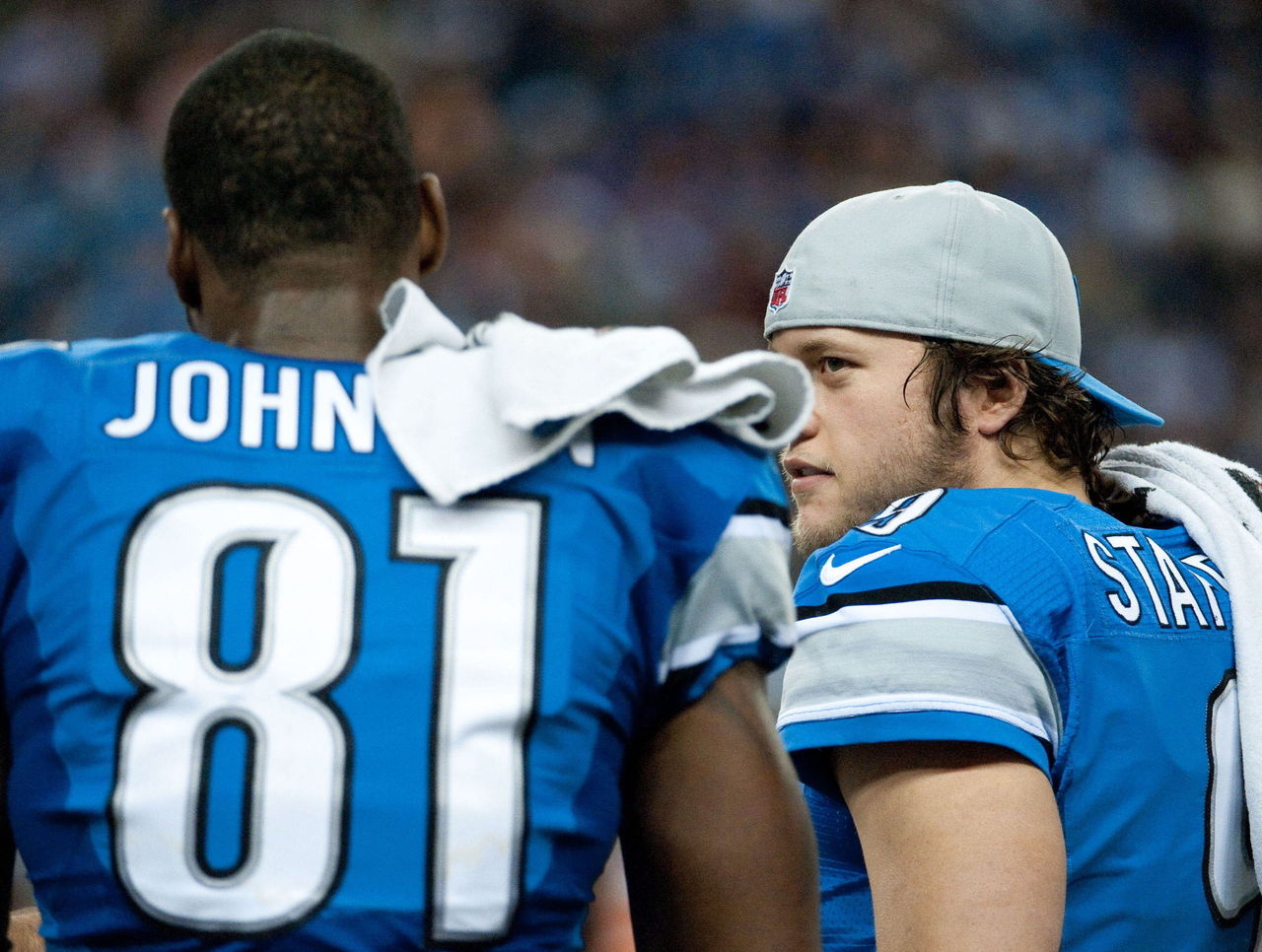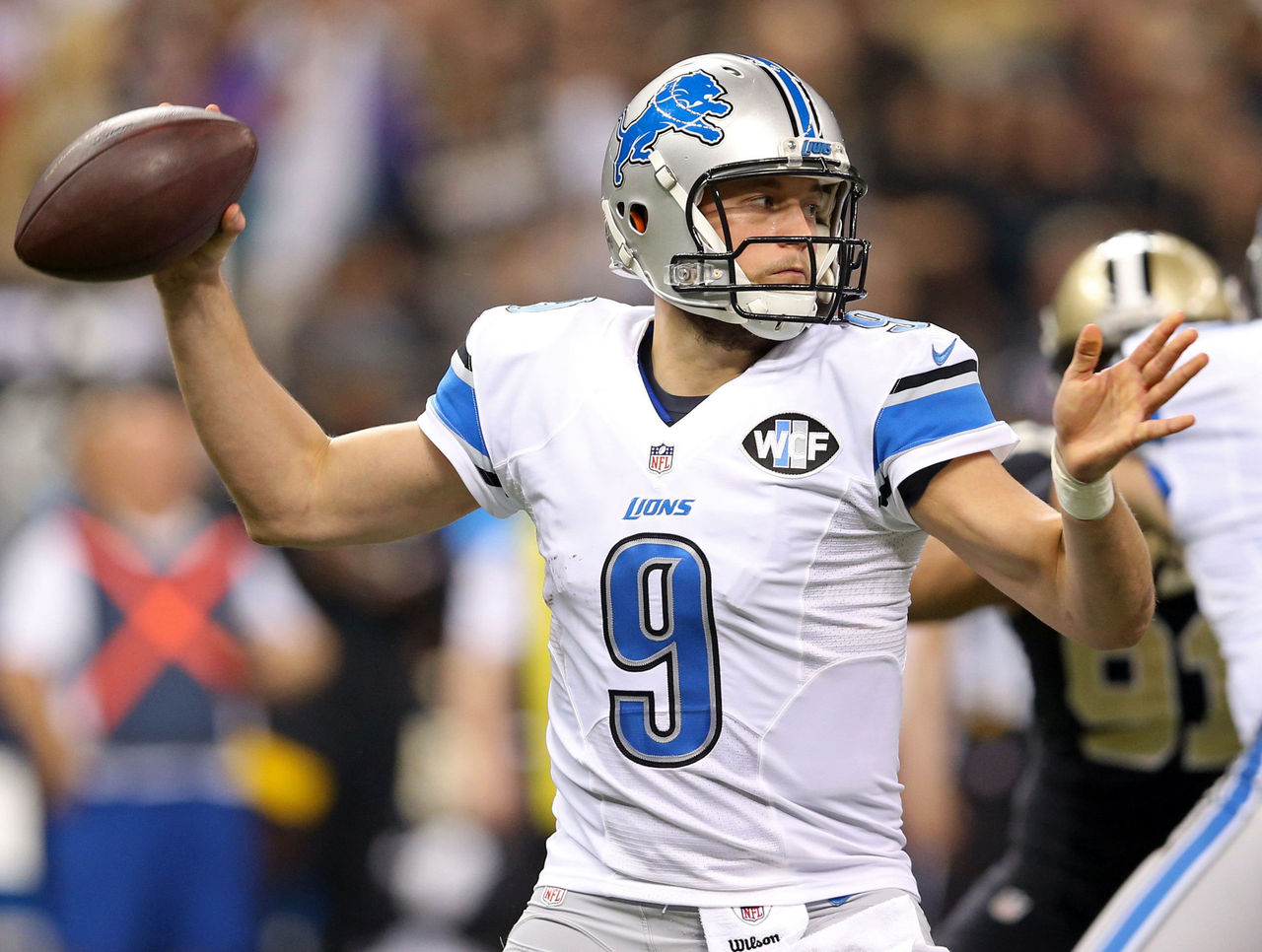Rosenfels explores the evolution of Matthew Stafford
Sage Rosenfels is a former 12-year NFL quarterback who writes, does radio, and podcasts about the NFL and college football.
The Detroit Lions selected Matthew Stafford as the first pick in the 2009 draft. Being the No. 1 pick can be a death sentence for quarterbacks, as you're immediately placed on the worst team in football and expected to turn around the entire franchise. This is a tall task for a young player, as I believe football is the ultimate team sport, and no quarterback can do it all themselves. Even Tom Brady or Aaron Rodgers can't make a bad team into a playoff contender. Football just doesn't work that way. Stafford has grown year by year, and is now allowing his team, which has finally made smart moves in the draft and free agency, to help him win football games.
When Stafford entered the NFL eight years ago, he had the ultimate weapon in Calvin Johnson. "Megatron" had already established himself as a top-tier wide receiver in the NFL, and now had a quarterback that could take advantage of his unmatched talent. Offensive coordinator Scott Linehan, who was my O.C. in Miami in 2005, loved the big-play combination of Stafford and Johnson. Before 2005, Linehan was the O.C. with the Minnesota Vikings, and directed a high-scoring offense with Daunte Culpepper and Randy Moss. As he installed our offense in Miami, you could clearly see his philosophy at work. He wanted to attack the defense down the field as much as possible. He loved the big play. He was aggressive, and many short routes were converted to "go" routes versus press coverage. He felt that if a defense was going to come up and play bump-and-run coverage, it was an offense's duty to attack them down the field.
He had plenty of luck with this philosophy in Minnesota with Moss and Culpepper. The strong-armed quarterback could throw it a mile, and Moss was unstoppable in his prime.
After failing as a head coach in St. Louis, Linehan was hired to coach the Stafford-Megatron combination, which would go on to produce huge numbers. Stafford had the strong arm of Culpepper, and Megatron was as close to Moss as you could find in the NFL. In 2012, the combination created the best season for a wide receiver in NFL history, as Johnson finished with 1,964 receiving yards. The only problem: the Lions won four games. Stafford's big arm and Megatron's absurd performance meant nothing in the win column.

Jump to four years later, and Stafford is having his best season ever. He's also without Megatron for the first time in his career. So was Johnson the problem? Obviously not, as he was one of the best wide receivers in the league during the last decade. I believe the real problem was that the previous coaching staffs spent way too much time trying to maximize Megatron's talent, and this, in turn, slowed Stafford's progress. While the Lions quarterback has always had a strong arm and a gunslinger's mentality, we're learning in 2016 that he's a significantly more well-rounded quarterback. As he enters the second half of his career, he's winning games with his head as much as his arm. You'd never use the term "game manager" with Stafford, but he was exactly that in his huge win versus the Vikings on Sunday.
"Game manager" has become a dirty label for NFL fans. It's not exciting, it's not all that fun to watch, and it generally doesn't win you the biggest games of the year. Headed into Sunday's game - a huge contest in the race for the NFC North - Stafford had studied and analyzed this Vikings' whole team. As a young quarterback, you spend the majority of your time trying to figure out how to attack a defense. As a veteran, you start to think deeper, and begin to study how you're going to win games. Remember I said that football is the ultimate team sport? Stafford knew this Vikings team had won the majority of their games with their defense and special teams the past two seasons. He knew that if his offense didn't screw it up, they'd be in position to win it in the end. To me, that's the epitome of a game manager.
Through 59 minutes and 37 seconds in that game, Stafford did very little, and his team was on its last breath. Having played so many games from behind in his career, he quickly switched from game manager to gunslinger, moving the Lions into field-goal range with two seconds left. After a game-tying kick, the Lions didn't relinquish the ball in overtime, as Stafford hit Golden Tate on a spectacular catch-and-run to finish the Vikings. This game showed me just how much Stafford has grown as a quarterback. He played conservatively for the majority of the game and waited until it was necessary to take risks. Let's take a quick statistical look at how Stafford's game has evolved over the years.
In 2009, when he entered the league, his completion percentage was a sorry 53 percent. He also threw just 13 touchdowns with 19 interceptions. As his career continued, he completed around or less than 60 percent of his passes, and threw about one interception per game. Things changed in 2015, as he had a new offense under Jim Bob Cooter and an aging Megatron. No longer was his game about the big play downfield, but instead he was all about accuracy and completions. Last year, his completion percentage jumped to 67 percent, and he threw 32 touchdowns with just 13 interceptions. This year, Stafford's numbers are even better. Though he won't throw for anything near 5,000 yards, as he did in 2011 and 2012, his completion percentage is again around 67 percent, and he's on pace for 30-plus touchdowns. Most importantly, he's only thrown five interceptions this season. Through nine NFL games, his numbers as a game manger are phenomenal.

Stafford has always had a huge arm. He's always been the quarterback who could make any throw. No game was out of reach with Stafford at quarterback. In the past, the Lions regularly found themselves behind in the fourth quarter, and relied on him to bring them back. Many times, he didn't disappoint, and has built a reputation as one of the best comeback quarterbacks in the NFL.
In 2016, Stafford is still one of the league's best when the Lions are down. The difference is, he's no longer relying on the big play to win games. He also is keeping the Lions in games by not forcing the football into double coverage. Rather than focusing on one wide receiver, he's spreading the ball equally to five different weapons. He's become one of the best quarterbacks in the league because of his new game manager mentality. But the rest of the NFL better stay on its toes. This guy still has big-time gunslinger ability just in case the Lions need it in the end, as they did in Minneapolis.
HEADLINES
- Harden's consistency, Quickley's value, Embiid is percolating
- Report: White Sox, Seranthony Domínguez agree to 2-year, $20M contract
- Marner: Leafs tribute will be 'weird, cool, special moment'
- Report: Bills to interview Rivers for head coaching job
- Leafs' Stolarz returns vs. Golden Knights after missing 33 games